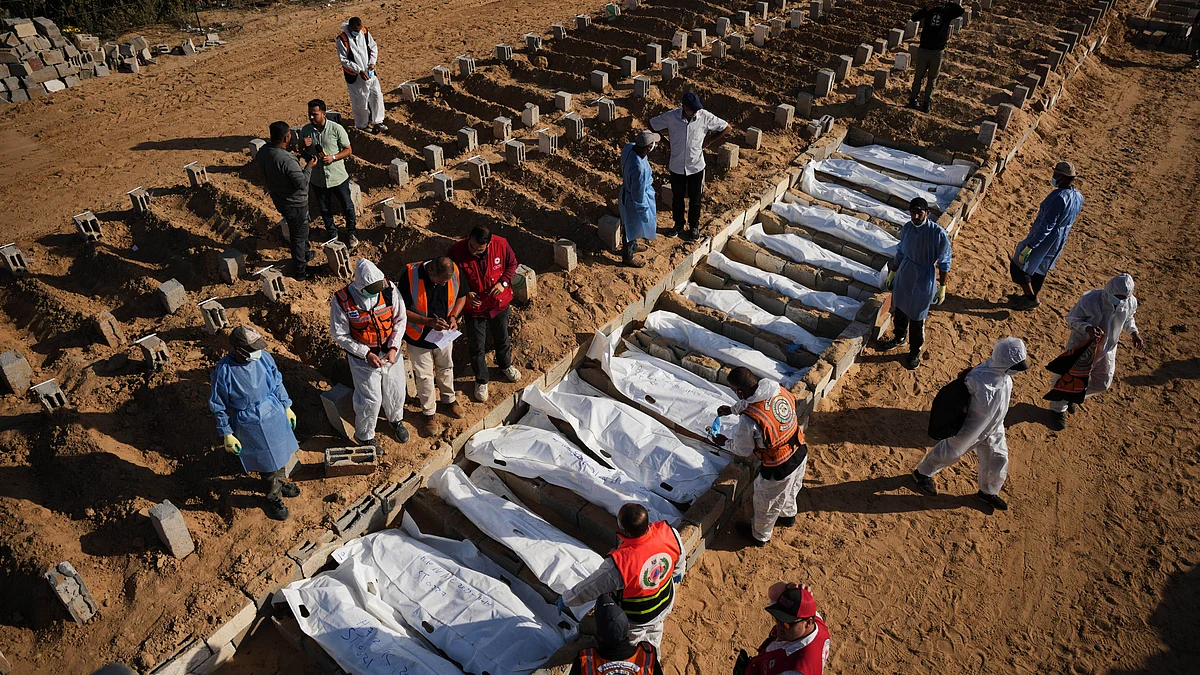Israel kills four in Gaza as Palestinian fighters recover body of captive
Israeli fire hit swathes of Beit Lahiya, while in the south, tanks and aircraft pounded areas near Rafah and the outskirts of Khan Younis

Israeli forces killed at least four Palestinians and wounded several others across Gaza on Monday, shattering the fragile calm of the six-week ceasefire, even as a Palestinian armed faction announced it had recovered the body of another Israeli captive amid the ruins of the war-scarred enclave.
In Bani Suheila, a southern town lying beyond the so-called “yellow line” controlled by Israeli forces, a Palestinian man was killed when a drone strike sliced through the quiet. Far to the north, tragedy struck again as unexploded ordnance left behind by departing Israeli troops detonated in Gaza City, killing a child and injuring several others — some critically, according to civil defence authorities.
Throughout the day, the skies above Gaza throbbed with the sound of artillery, the rumble of tanks, and the whirring blades of helicopters, the Al Jazeera reported. Israeli fire hit swathes of Beit Lahiya, while in the south, tanks and aircraft pounded areas near Rafah and the outskirts of Khan Younis.
Abu Azzoum described the eastern neighbourhoods of Gaza as facing “systematic destruction,” with testimonies from families suggesting an attempt to carve out buffer zones by rendering entire districts uninhabitable — a transformation that could make the return of displaced families even more agonisingly distant.
In central Gaza, civil defence crews, working alongside police and the Red Cross, pulled eight members of a single family from the rubble of their home in Maghazi camp, destroyed in an earlier strike, Wafa reported. The Gaza Government Media Office said 582 bodies have been retrieved since the ceasefire began, while more than 9,500 people remain missing beneath mountains of shattered concrete.
Amid this devastation, the Palestinian Islamic Jihad announced it had recovered the body of an Israeli captive in Nuseirat camp. Should the remains be identified, two additional bodies will need to be found under the terms of the ceasefire, which requires Israel to return the remains of 15 Palestinians for each captive’s body.
Hamas has repeatedly said that the vast destruction has made the search for bodies perilous and painstaking.
Meanwhile, the GHF — a US-backed group that operated parallel to UN aid structures — abruptly ended its activities in Gaza, citing conditions laid out in the October ceasefire. UN experts say at least 859 Palestinians were killed near GHF distribution sites since May 2025, many shot as they desperately gathered for food. The programme was widely condemned for sidestepping established humanitarian channels.
Across the occupied West Bank, night brought no respite. Israeli forces launched sweeping raids, arresting at least 16 Palestinians in towns and villages from Tulkarem to Bethlehem, Ramallah to Jenin. In Deir Jarir, north of Ramallah, violence escalated when Israeli settlers attacked Palestinian homes on Sunday night. Israeli troops, reportedly arriving to shield the settlers, opened fire on Palestinians who confronted them. Among the victims was 20-year-old law student Baraa Khairi Ali Maali, who died after being shot in the chest — one month after another young man was killed by settlers in the same village.
Elsewhere, two Palestinian women were injured and two brothers detained during a raid in Kafr Qaddum, while settler attacks continued unabated. Farmlands between Atara and Birzeit were torched, and in Atara, settlers from a newly erected outpost burned olive trees and stole farming tools.
In the past two years, settler violence has surged to some of its highest levels. Since 7 October 2023, at least 1,081 Palestinians — including 223 children — have been killed in the occupied West Bank by Israeli forces and settlers, with more than 10,600 wounded and over 20,500 detained.
Across the border in Lebanon, tension simmered as Hezbollah held a funeral for senior commander Haytham Ali Tabatabai, assassinated by Israel a day earlier. Mourners carried his coffin through the streets of Beirut’s southern suburbs, Hezbollah flags rippling overhead.
Hezbollah has not announced how it will respond. The group’s political council vice president, Mahmoud Qmati, called the killing “another ceasefire violation,” accusing Israel of escalating the conflict with a “green light from the United States.”
Analysts say Hezbollah is weighing its next steps with extreme caution. Security expert Ali Rizk warned that the group is unlikely to hand Israeli Prime Minister Benjamin Netanyahu “an excuse to launch an all-out war” — a conflict he suggested could be catastrophic.
Others see the regional dynamics shifting. Analyst Joe Macaron argued that the United States is no longer restraining Israel, instead supporting its operations in Syria, Gaza and Lebanon.
From Beirut, Al Jazeera reported that Hezbollah now faces a strategic dilemma: retaliate and risk a devastating confrontation, or remain restrained and risk appearing weakened.
Lebanese American University’s Imad Salamey said any Hezbollah response would likely trigger a “severe” Israeli reaction. He argued that Netanyahu’s government “is eager to escalate” to bolster its political survival, while Hezbollah’s once-formidable deterrence capacity has been eroded — along with the support networks it relied on through Syria.
Follow us on: Facebook, Twitter, Google News, Instagram
Join our official telegram channel (@nationalherald) and stay updated with the latest headlines
